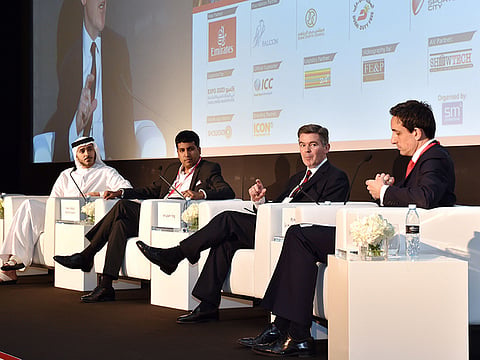Dubai tourist numbers, spend likely to grow post Expo 2020
Emirate’s infrastructure and connectivity show it can host global events

Dubai: Dubai, the host city for the Expo 2020, is expected to see visitor numbers and spend grow even after the exposition wraps up, industry experts say.
Issam Kazim, chief executive of the Dubai Corporation for Tourism and Commerce Marketing (DCTCM), said that Dubai’s infrastructure and air connectivity demonstrate that it can host other global events and allows the emirate to be “top of mind for the multinational corporations who are looking at the ideal location to set up regional hubs.”
“That creates a sustainable model because more people are coming in and more events [take place] and creates a cycle that we can benefit from beyond the expo,” he said, speaking at the Host Cites conference in Dubai on Thursday.
Echoing Kazim’s view, David Bond, director at communications company Milltown Partners and former BBC sports editor and director, said that Dubai will see a tourism boom after the expo.
“Dubai will reuse the expo to reshape the way people look at this particular emirate and that will produce a tourism boom both in terms of numbers and spend in the years to come,” he said.
The number of tourists in London during the London Olympics in 2012 “went down but the amount of money spent by the tourists that came went up,” Bond pointed out, adding that tourist numbers and spend picked up in the years following the event.
Dubai will host the Expo 2020 for six months from October 20, 2020 to April 10, 2021. It is said to be the biggest event that the UAE will host and is expected to attract 25 million visitors.
By 2020, Dubai has also set a target to welcome 20 million visitors annually. To achieve the vision, the Dubai Department of Tourism and Commerce Marketing (Dubai Tourism) is focusing on promoting the emirate as leading family and event destinations, as well as enhancing its position as a business destination.
To accommodate the influx of visitors expected by 2020, the emirate will need to boost the number of hotel rooms, which currently stands at over 88,000, to between 140,000 and 160,000. It is also working on diversifying its hotel accommodation, offering more three-and four-star hotels, which are popular with families and business travellers.
Dubai is also looking to attract visitors from non-traditional tourism source markets. Dubai Tourism opened its first office in South Korea, located in Seoul, earlier this week, to “drive growth from a market in which, like many countries across Asia, we see significant potential,” Kazim said in a statement. Dubai attracted 13.2 million visitors in 2014, up 8.2 per cent from the previous year.
Sign up for the Daily Briefing
Get the latest news and updates straight to your inbox


